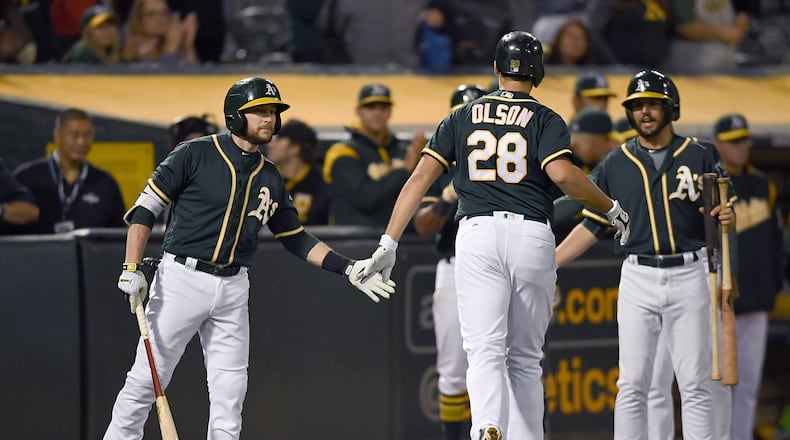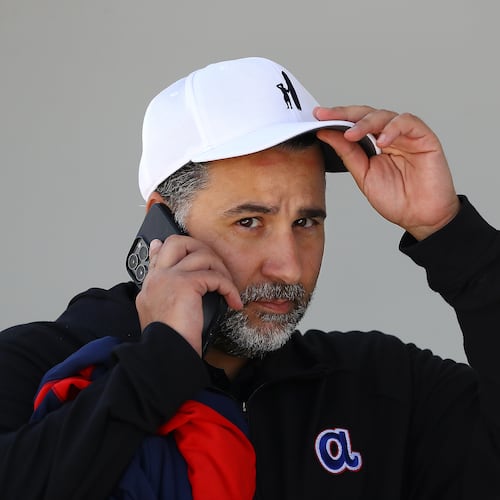It doesn’t bring much joy to write this, but such is baseball business. First baseman Freddie Freeman, whom we all know and love, will suit up for a non-Braves team on the April 7 opening day. The Braves’ blockbuster move Monday seemingly confirmed it.
We’ve talked about Freeman’s situation ad nauseum for over a year. We know that his play, character and leadership is A-plus, plus, plus. We know what he means to Atlanta. We know he’s impossible to replace. He’s the clear Plan A. Or rather, we thought he was.
The Braves traded for A’s slugger Matt Olson on Monday, acquiring an All-Star at first base. Freeman is destined to join another club. It’s a lot to digest given Freeman’s status as an all-time beloved Brave. The reigning World Series champions, who rebuilt their entire operation around Freeman and completed their revival with a title, are bidding the face of their franchise farewell.
Swapping Olson for Freeman is one of the gutsiest moves in Braves history (many of you will use other adjectives to describe it). But let’s take emotion out of it for a moment. From a baseball standpoint, Olson is a nice consolation. He was their best alternative.
Olson, who played at Parkview High, is one of baseball’s premier sluggers. Removing the 60-game season of 2020, Olson has averaged 32 homers over the past five years. He’s coming off an All-Star nod in 2021, hitting .271/.371/.540 with 39 homers, 35 doubles, 111 RBIs and 101 runs scored. He finished eighth in MVP balloting.
Normally, one would be thrilled to see that production plugged into the Braves’ order; that’s much less the case knowing that it’s replacing Freeman. Yet acquiring Olson helps keeps the Braves among the National League’s top clubs. Losing Freeman is a blow, but not a devastating one for an organization loaded with youth and options.
Olson should be an easy fit in the Braves’ clubhouse. He’s a low-key figure, producing like a star without the attention and accolades because of his uniform (those kelly greens are sweet, though). Olson famously formed his batting stance by emulating Ken Griffey Jr. and Chipper Jones growing up. Olson idolized Jones growing up, of course.
During an interview with Baseball on Fanatics View on YouTube in February 2020, Olson said: “When I was growing up, Chipper Jones was the guy in Atlanta. I’m from Atlanta. I grew up trying to replicate his toe tap. I loved watching Ken Griffey Jr. Being a lefty, he had the sweetest swing out there. So those two guys had the biggest influence.”
Do Olson’s ties to the city and team matter? Not really. They’re just the cherry on top of his production, at the plate and in the field, which is what actually makes him an ideal fit. It’s rare that a team can lose an All-Star and plug another right into his place.
Olson joins a World Series core. The lineup still features Ozzie Albies, Austin Riley and Ronald Acuna when he returns. Their rotation will be led by Max Fried, Charlie Morton and Ian Anderson. Their bullpen still has the fire and charisma America adored in October.
So why did the Braves have this opportunity? Olson, who turns 28 this month, is a trade candidate because the A’s don’t pay premiums. He became the latest All-Star to leave Oakland as he becomes pricier. Olson will go through arbitration for the third and final time next winter and become a free agent in 2024, when he’s sure to be well-compensated if healthy.
It’s worth mentioning that the Braves would need to give Olson a long-term deal soon, putting them in a similar position they’re in now, but there are two seasons before they’re forced into that decision. In the meantime, Olson keeps first base a strength during their wide-open contention window. Given what the team paid to acquire him, perhaps they explore an extension in the near future.
That takes us to the cost. We’ll delve more into it in the coming days, but the Braves, who for years have clung to their prospects, finally cashed in. They sent outfielder Christian Pache, catcher Shea Langeliers and pitchers Joey Estes and Ryan Cusick to Oakland. It’s been a long time since we’ve seen the Braves make such a seismic deal. It speaks to Olson’s talent and their own situation which, if Freeman left, would’ve left them desperate at first base.
Oakland did very well. Pache is, at worst, going to be a long-time elite defender. It’s a bit shocking the Braves dealt Langeliers, whose defensive prowess placed him among the best backstops in the minors. It seemed he’d be their long-term answer at catcher. Estes has some intrigue, as does Cusick, who tops at 102 mph and was the Braves’ first-round selection last summer.
The Braves hadn’t shown an inclination to part with top prospects under general manager Alex Anthopoulos. This was the logical time to deviate. First base would be a glaring hole on a contender. The first-base market was barren beyond Olson. If you’re going to lose Freeman, Olson was really the only available player who could provide similar production.
“This was the hardest transaction I’ve ever had to make,” Anthopoulos told reporters Monday.
Our Mark Bradley laid out the Freeman situation recently and shared this Olson tidbit: In FanGraphs’ ZiPS projections, Freeman projects to be worth 4.0 fWAR this season. The younger and cheaper Olson projects a 4.8 fWAR.
This is not advocating for the Braves’ apparent decision not to retain Freeman. I think it’s a darn shame Freeman won’t be a Braves lifer, a total letdown after one of the highest highs in franchise history. The team will rightfully be criticized. I’d argue it’s inexcusable that it reached this point. Freeman’s exit would rival Tom Glavine’s departure as the most notable in Atlanta sports history. It’s the type of loss that leaves scars, regardless of whether the team was proved correct in its assessment.
Freeman is one of the greatest Braves ever. He deserves to have his number retired. But he also deserves his money and appreciation, whether that’s from the Dodgers, Yankees or whomever. Legacy wise, he’ll always be a Brave, beloved as a franchise great and world champion. Olson undoubtedly has big shoes to fill.
Olson was a realistic best-case alternative that keeps the Braves in the National League East’s driver’s seat. We’ve said before, if Freeman goes, as difficult as it’d be, as much blame will be thrown around, as many iterations of “I’ll never forgive them” will be said, the Braves will move forward. And they acted before Freeman landed with his new employer.
With Olson in the fold, the Braves are OK. He won’t fix the public-relations mess that would erupt with Freeman’s exit, but he should help the team keep winning. Winning fixes everything. Well, almost everything.
About the Author
The Latest
Featured


